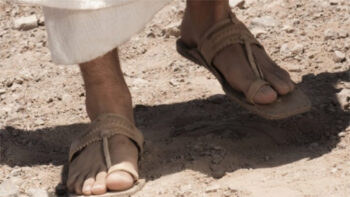Embracing our Humanity

By Teresa Rayner
Life has been a roller coaster lately. One day, everything's going great and I’m super organised and enjoying living life to the full, and the next, I’m feeling overwhelmed and stressed!
I don’t know about you, but I find that often it can be very easy to feel guilty for those downward roller coaster dives. If I know God loves me and has set me free, I shouldn’t be feeling stressed about anything right? Ideally, yes – but I don’t think even the saints had that perfected! It’s much easier said than done. And God doesn’t expect us to have it all together all the time – or even some of the time. He doesn’t mind if we’re feeling stressed or burnt out. To be clear, this doesn’t mean He wants us to stay that way. But God knows what it is like to be human. And following Him doesn’t mean total freedom from worldly cares – rather the ability to allow Him to carry them with us.
 Recently I participated in a five-day silent retreat. On one of the days, we were asked to get in touch with Jesus’ humanity. Now I don’t know what you think of Jesus, but personally, I tend to skip over the human side of Him and focus more on His divinity. It’s kind of like what we do with the saints – we know they’re human, but they’re not human like us right? They’re different, holier, ‘better’ humans. And Jesus is human, but not like us! But during this retreat, as I flicked through Scripture pinpointing moments where Jesus’ humanity was really at the fore, I connected with Him even more deeply.
Recently I participated in a five-day silent retreat. On one of the days, we were asked to get in touch with Jesus’ humanity. Now I don’t know what you think of Jesus, but personally, I tend to skip over the human side of Him and focus more on His divinity. It’s kind of like what we do with the saints – we know they’re human, but they’re not human like us right? They’re different, holier, ‘better’ humans. And Jesus is human, but not like us! But during this retreat, as I flicked through Scripture pinpointing moments where Jesus’ humanity was really at the fore, I connected with Him even more deeply.
Did you know that one time Jesus was so focused on His ministry, His friends had to remind him to eat (John 4:31)? The Bible says ‘urge’ - He didn’t just need a friendly reminder, but it seems as though Jesus hadn’t eaten in a while and the disciples were fearing for His health. Going right back to the beginning, Jesus came into this world as a tiny, helpless baby – or as Sister Judy (a Missionary of God’s Love) said on retreat; ‘He was squashed out like the rest of us.’ He was born – He didn’t just suddenly appear in the stable! Jesus experienced anger - we all know the time He started flipping tables in the Temple (Matthew 21:12-13). He felt sorrow and grief just as we do, weeping at Lazarus’ tomb (John 11:35). Jesus knew death was not the end, and He even said that Lazarus would live again, yet He still wept. He knew rejection - despite all the amazing miracles and signs He worked, His own townspeople still rejected him (Luke 4:24-29), and we know He was rejected, even to the point of death. One of Jesus’ closest friends betrayed Him. Thomas doubted, even after walking with Him for three years. Peter denied Him. Of His friends, only John was there at the foot of the cross as He died.
You would think being the Son of God would mean plain sailing, adoring crowds, and an easy life. Just as we would think holiness comes naturally to the saints or being Christian makes life perfect all the time because we have God. These are things we seem to sub-consciously believe, but when it’s written out in such plain terms, that doesn’t sound right, does it? We know Jesus’ life was not easy – He endured rejection, betrayal, hunger, grief, suffering, and even death, forsaken even by His own Father (Matthew 27:46).
 Take a moment to sit with Jesus at the Mount of Olives as He prayed that He wouldn’t need to endure what was coming (Luke 22:39-44). Even knowing the bigger picture - even knowing this wasn’t the end - Jesus was still human, and still struggled with the inevitability of suffering.
Take a moment to sit with Jesus at the Mount of Olives as He prayed that He wouldn’t need to endure what was coming (Luke 22:39-44). Even knowing the bigger picture - even knowing this wasn’t the end - Jesus was still human, and still struggled with the inevitability of suffering.
Jesus shows us how we can still live life to the full while embracing our humanity. He shows us that a life with God doesn’t mean there will be no suffering or weakness. But, as we celebrate during the Easter Season, ultimately He reminds us that God is greater. God can use even the darkest of moments to shine His light and fill us with His love. So, it is OK to experience downward roller coaster moments! It’s OK to be human. Where we fall short – and we will, a lot – God makes up.
At a recent canonisation ceremony, Pope Francis said;
“Holiness does not consist of a few heroic gestures, but of many small acts of daily love...[The saints] discovered an incomparable joy and they became brilliant reflections of the Lord of history. For that is what a saint is: a luminous reflection of the Lord of history.”
A saint is not someone who is somehow holier than, or above, the things of this world. They are someone who reflects the ‘Lord of History.’ How? By embracing their humanity just as Jesus did, and allowing their lives – suffering, stress and all – to reflect the love of God as exemplified through Jesus Christ.
So next time you’re feeling very human and frail and weak and are tempted to start piling on the guilt because you feel you’re not living as a good Christian should (whatever that means!) - think ‘What would Jesus do?’
 Entries(RSS)
Entries(RSS)